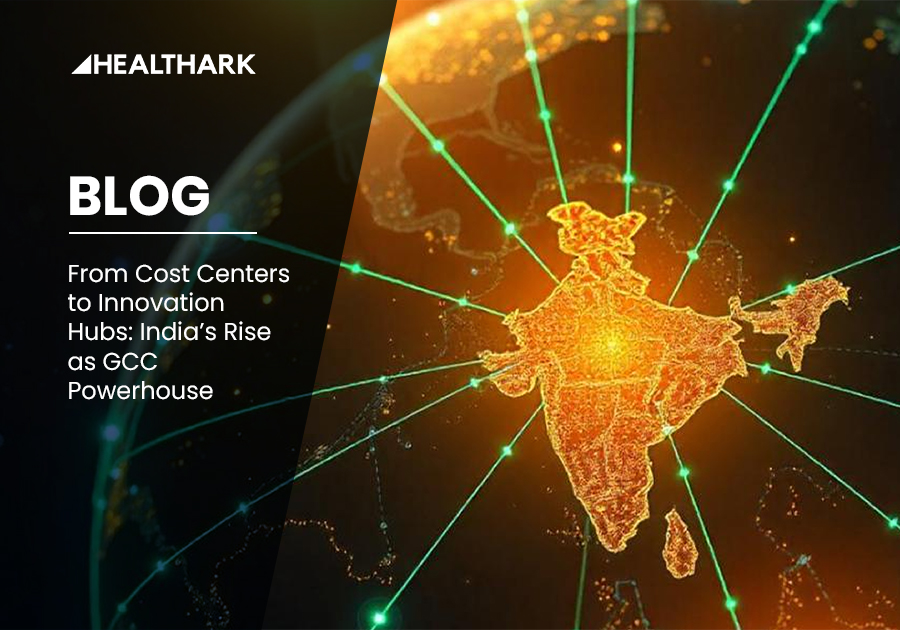Once seen as mere cost-saving outposts, Global Capability Centers (GCCs) in India have undergone a significant transformation. From managing back-office tasks to driving innovation and shaping global business strategies, these centers are now at the heart of the healthcare and life sciences revolution. India’s rich talent pool and technology-friendly ecosystem have turned the country into a strategic hub for multinational healthcare and life sciences companies expanding their GCC operations.

Journey from Cost Efficiency to Global Leadership
During 1985-1990, GCCs began as modest cost-saving units—“a new industry” born of a drive for efficiency. Throughout the 1990s, India attracted multinationals for offshoring, with early GCCs focusing on operational roles like IT support, finance, and HR. By 2000, there were around 700 GCCs in India valued at $11.5 Bn and employing 0.4 Mn skilled professionals.
Entering the 2000s, the landscape began to shift. GCCs evolved into strategic assets with roles beyond cost savings, especially as the talent pool in engineering and data science expanded. By 2010, over 1,300 GCCs contributed $33.8 Bn to the economy with 1.3 Mn professionals, reflecting India’s rise as a global GCC powerhouse.
However, as companies recognized the untapped expertise within these centers, GCCs evolved to take on more sophisticated functions. India’s growing technical proficiency in engineering, data science, and pharmaceuticals has led healthcare and life sciences GCCs to move beyond operational roles. They have become centers for innovation and strategy. By the 2020s, GCCs in India reached new heights with 1,700+ centers contributing $64.4 Bn. A workforce of 1.9 Mn solidified their role as leaders in global digital and healthcare transformation.
Today, India accounts for over 50% of global GCCs across sectors, a figure that underscores its prominent role as a destination for these centers worldwide. The GCC market in India is expected to exceed $100 Bn by 2030. This growth is driven by a skilled workforce, government policies, and an expanding presence in tier-2 cities. As GCCs matured from cost-saving centers to strategic assets, their focus expanded beyond efficiency, tapping into India’s growing expertise in data science and engineering. This evolution set the stage for a new era where advanced technologies, especially artificial intelligence, would drive innovation and transform these centers into global digital pioneers.
The AI Advantage – Harnessing AI for Healthcare Innovation
The healthcare GCCs in India have become indispensable to the digital transformation efforts of multinational companies. Rapid advancements in artificial intelligence (AI), machine learning (ML), big data, and cloud computing have equipped these GCCs to handle complex data and create actionable insights. Here are some specific areas where digital capabilities are transforming Indian healthcare GCCs:
- AI and Predictive Analytics:
GCCs leverage AI and predictive analytics to analyze vast healthcare datasets, facilitating personalized medicine. For instance, they create algorithms that identify patient subgroups likely to respond to specific treatments based on genetic information and historical data. Additionally, predictive models are developed to forecast disease outbreaks, helping healthcare providers allocate resources effectively and prepare interventions in advance. Another application includes patient risk stratification, improving preventive care through EHR analysis.
- Drug Discovery and R&D:
AI-driven tools like virtual screening methods accelerate drug discovery by evaluating chemical compounds for potential efficacy against targeted diseases. Furthermore, they implement simulations and predictive modeling to optimize clinical trial designs, thereby reducing the number of patients needed for trials and accelerating regulatory submissions. They may also utilize AI-driven biomarkers to identify patient populations that are more likely to benefit from new therapies, enhancing trial outcomes and efficiency.
- Digital Health Platforms:
Indian GCCs are at the forefront of developing comprehensive digital health platforms encompassing telemedicine and remote diagnostics. Integrated apps enable virtual consultations and remote monitoring through wearables, while AI-powered chatbots support chronic condition management, enhancing patient care and adherence. Additionally, some GCCs are working on AI-driven chatbots that assist patients in managing chronic conditions. These chatbots provide personalized health tips and reminders, thereby improving adherence to treatment regimens and overall health outcomes.
Since the early 2000s, major global healthcare and life sciences companies have established GCCs in India, making substantial investments to build digital capabilities and drive innovation. Today, digitalization is standard across these GCCs, with approximately 85% utilizing big data analytics, 80% adopting robotic process automation (RPA) and other automation technologies. Moreover, 60% are implementing AI and machine learning for medical imaging and clinical trial optimization. This digital focus has positioned GCCs as technology leaders, ensuring that companies remain competitive and agile in meeting industry demands.
Impact and Contributions to Healthcare R&D
Building on these technological advances, the scale and impact of AI-driven initiatives in India’s healthcare GCCs are evident in the numbers. This highlights the substantial growth and investment that make India a strategic global hub for healthcare innovation.
As of 2023, there are more than 95 Healthcare and Life Sciences GCCs employing over 280,000 people in India. Major contributors include Novartis, Pfizer, Abbott, and Siemens Healthineers leading the way. A substantial 75% of this talent pool is concentrated in cities like Bengaluru, Hyderabad, and Mumbai, which serve as innovation hubs for these companies. The healthcare sector in India is anticipated to continue its GCC expansion, further solidifying the country’s role as a strategic hub in global healthcare.
Life Sciences Healthcare GCCs in India have emerged as vital centers for advancing clinical trials, focusing on clinical data management, document writing, and regulatory compliance. These centers support many essential functions, including biostatistics & programming for sample size calculation and statistical analysis. They also aid in clinical data science to interpret trial data. Out of the total talent pool of 25,000-30,000 in drug discovery and development, approximately 40% of professionals are engaged in clinical trials. These GCCs play a critical role in accelerating drug discovery and strengthening India’s position as a core contributor to global clinical research initiatives.
Healthcare GCCs in India lead advancements in areas like molecular diagnostics, genetic engineering, and regenerative medicine. The commitment of these centers to high-impact healthcare projects highlights their importance in advancing healthcare globally.
Leadership Prominence and Success Stories
Life sciences and healthcare GCCs in India have gradually evolved into full-fledged innovation hubs, driving product development and R&D for their parent companies. This stage of GCC transformation leverages AI, data analytics, and automation to streamline global operations and foster local innovation. Companies like AstraZeneca, Pfizer and Novartis have set up GCCs that are now core centers for research.
AstraZeneca’s Global Capability Center (GCC) in India was established in Chennai in 2014. It has evolved from a traditional IT support unit into a core innovation hub supporting AstraZeneca’s global digital strategy. With over 3,100 employees, the center plays a critical role in the company’s R&D, digital healthcare initiatives, and IT service functions. The centers support end-to-end pharmaceutical processes, including drug discovery, product development, and supply chain management.
Pfizer’s Global Drug Development Centre in Chennai with ~1,000 employees, is a strategic R&D hub focusing on creating complex sterile injectable drugs and innovative formulations. It also supports a variety of projects globally, especially in small molecule research and active pharmaceutical ingredients (APIs).
Similarly, Novartis with over 8,000 associates supports numerous high-value functions, including Drug Development, Manufacturing, Supply and Quality, Human Resources, and Legal. These facilities along with other pharmaceutical GCCs are contributing significantly to pharmaceutical innovation and regulatory compliance while conducting large-scale clinical trials and optimizing supply chains.

Future Outlook of Healthcare and Life Sciences GCCs in India
India’s healthcare GCCs are positioned for significant growth as the global shift toward digital and personalized medicine accelerates. Supported by a robust local talent pool and favorable government policies, these centers are evolving into innovation hubs. Their expansion into digital therapeutics, AI-driven drug discovery, and telemedicine is enhancing their value as strategic assets for multinational healthcare organizations. By 2030, the number of Life Sciences and Healthcare GCCs in India is expected to exceed 160, with a workforce surpassing 4,20,000 people. This evolution underscores the role of Indian GCCs not just in operational support but as essential contributors to the future of global healthcare competitiveness and innovation.




